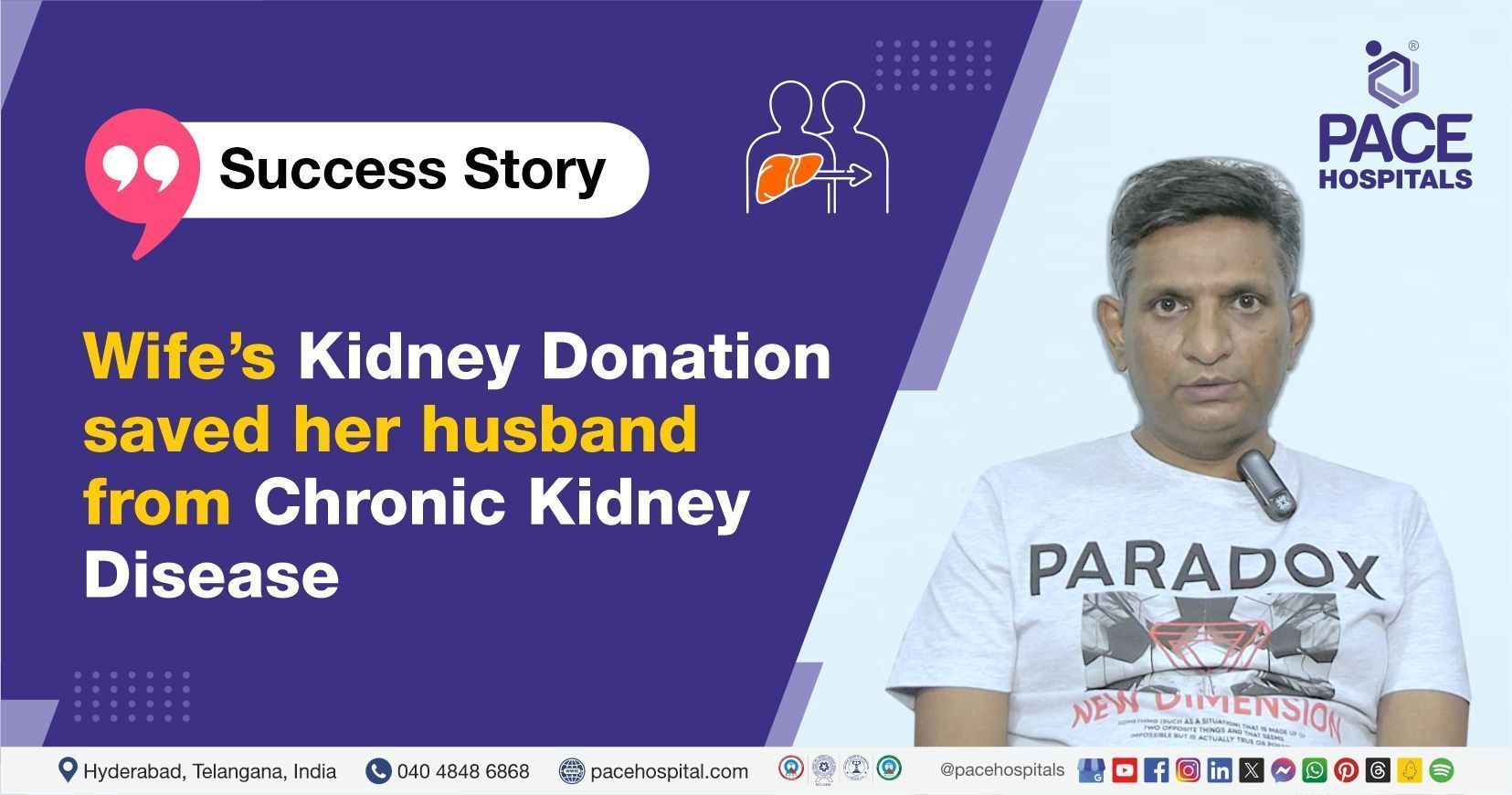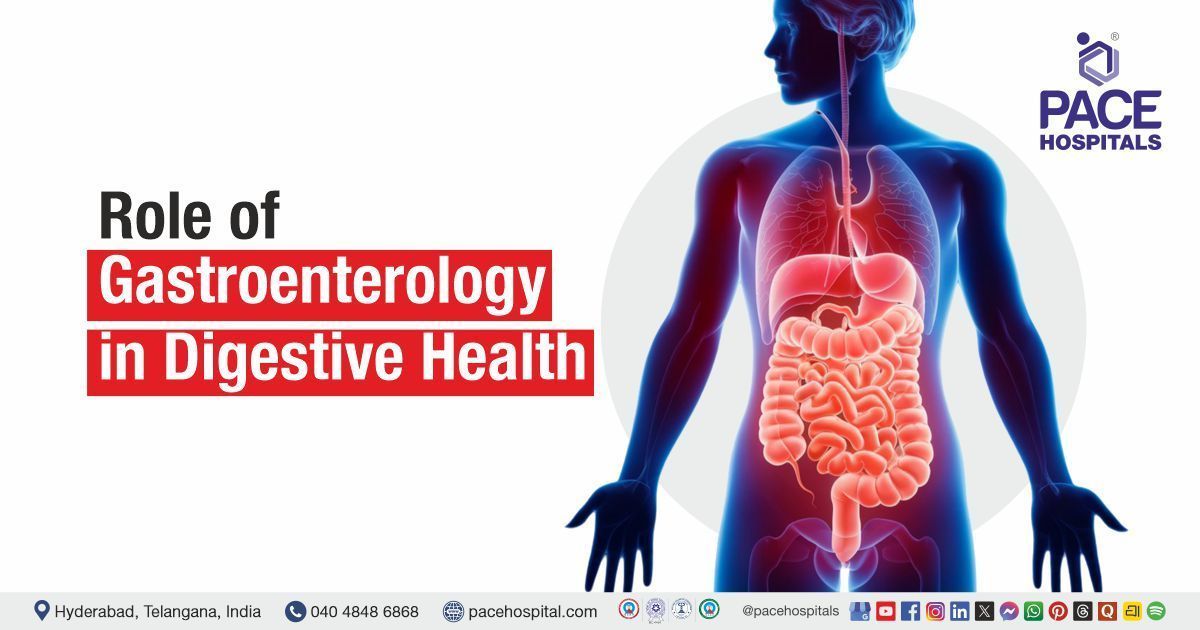Wife’s kidney donation saved husband from chronic kidney disease | Case study
Pace Hospitals
PACE Hospitals' Kidney Transplantation team achieved a milestone with a successful Living Donor Kidney Transplantation (LDKT) for a 46-year-old male patient battling chronic kidney disease due to suspected chronic glomerulonephritis.
A 46-year-old male patient (Abhay Singh) with a history of suspected chronic glomerulonephritis was presented to the consultant nephrologist and renal transplant physician Dr. A Kishore Kumar.
Medical History
Delving deeper, it was understood that the patient was a known case of
chronic kidney disease (CKD) and was dependent on dialysis since at least 10 months. An arterio-venous fistula (an abnormal but necessary connection between an artery and a vein to facilitate dialysis) was made on the left hand and his urine output was lesser than 400 ml per day. The normal range for urine volume is 800-2,000 ml per day.
Diagnosis
Upon admission to PACE Hospitals and completion of the necessary investigations, including blood tests, kidney function tests, liver function tests, and imaging studies such as abdominal ultrasonography, evaluation of the patient's profile led to a diagnosis of chronic kidney disease secondary to suspected chronic glomerulonephritis.
The increase levels of serum glutamic pyruvic transaminase (SGPT) and serum glutamic-oxaloacetic transaminase (SGOT) demonstrates liver injury. It can be concurred with hypoxia condition of the chronic kidney disease which increased oxidative stress stimulating liver injury.
The native kidney disease was not exactly identified and was suspected to be chronic glomerulonephritis. The slightly anaemic profile of the patient can be traced to reduction of erythropoietin (an enzyme for the bone marrow to produce red blood cells) causing anaemia.
Based on the diagnosis, the patient was advised to undergo
Chronic Kidney Failure Treatment in Hyderabad, India, under the care of the Kidney Transplant Department, ensuring comprehensive management of the condition.
Treatment
After consultations with the team of Kidney Transplant Surgeons at PACE Hospitals, Hyderabad, Dr. Vishwambhar Nath, Dr. Abhik Debnath, and Dr. K Ravichandra, it was determined that a renal transplant was the only way to salvage the patient.
Promptly, the patient was put on multiple lifesavings supports and continued haemodialysis. Efforts were made to obtain a kidney from donors. Understanding the condition of her husband, the wife of the patient came forward to donate her right kidney.
With necessary investigations done & clearances obtained, the patient underwent Living Donor Kidney Transplant in Hyderabad at Pace hospitals, receiving the right kidney. The procedure was supervised by the consultant nephrologist & renal transplant physician
Dr. A Kishore Kumar, and it was accomplished devoid of any complications.
The Aftermath
Concerning the renal profile and the transplanted kidney, the post-operative period was uneventful. Since both the recipient and the donor are A+ blood group, incompatible complications can be ruled out. The graft placed in the right iliac fossa and end to side anastomosis to external iliac artery and vein.
The surgeons felt the thrill at the site of anastomosis and renal artery (thrill is a medical term which explains the common procedure to understand the flow of blood circulating through the anastomosis) The graft perfusion improved along with urine output gradually.
To improve flaccid kidney, anticardiolipin antibodies were infused after immediate perfusion, during the transplant surgery.
Post surgery, the patient was shifted to ICU and was kept on observation. The necessary medicines, immunosuppressives, antibiotics, proton pump inhibitors, multivitamins, antiemetics, analgesics, antipyretics & other supportive care were given to treat the conditions of transplant especially any rejection.
On the 5th day after surgery, the patient was extubated (removing an endotracheal tube, liberating the patient from the mechanical ventilator). The serum creatinine level improved to 1.1 mg/dL. The serum creatinine level, which is one of the indices of renal function. Its normal level ranges from 0.74-1.35 mg/dL.
Regular tests were done to understand the overall health of the patient. On the same day, the patient’s routine liver function test demonstrated transaminitis (a condition of increased liver enzymes called transaminases) The liver transaminases were on a decreasing trend. The medical team deduced that it could be an antibiotic induced liver insufficiency upon which, they abruptly stopped the antibiotics. Subsequently, the liver enzymes begun to rise up.
The patient and his attenders were counselled regularly regarding the prognosis of the transplantation and the graft, along with the risks that may come with it.
Once the patient achieved hemodynamic stabilization, he was discharged with the prescribed medications. He was advised to schedule a follow-up appointment with the Kidney Transplant Surgeons in Hyderabad at PACE Hospitals to assess his post-operative condition and ensure continued recovery. During discharge, the liver transaminases were stabilized. A stent was placed in the body (in situ). It is a regular surgical procedure to hold the ureter open until a proper pathway for urine drainage was reestablished, healing the surgical connection between the transplanted ureter and the bladder.
Dr. A Kishore Kumar (Consultant Nephrologist & Kidney Transplant Physician) who helmed the surgery, praised the selfless act of the wife and remarked the role of healthcare team in the procedure, “Thanks to the haste search efforts of family members and the medical acumen of the PACE team of coordinators and medical specialists, we could successfully accomplish the transplantation of the kidney. Both the donor and the recipient are doing well," said Dr. A Kishore Kumar, the consultant nephrologist & renal transplant physician, at PACE Hospitals, Hyderabad.
Conclusion
This case underscores the effectiveness of living donor kidney transplantation in managing End-Stage Renal Disease Treatment in Hyderabad, India, even when originating from chronic glomerulonephritis, highlighting the critical role of familial support and the advanced capabilities of PACE Hospitals in providing timely, high-quality renal care.
The happenstance of elevated liver enzymes after kidney transplantation
Elevated hepatic aminotransferases—alanine transaminase (ALT) and aspartate aminotransferase (AST)—are indicative of hepatocellular injury and are commonly observed in kidney transplant patients, with studies reporting an incidence ranging from 7% to 67%. Kidney transplant doctors/specialists recognize that drug-induced liver injury is a prevalent concern post-transplant, often becoming a chronic condition and ranking as the fourth leading cause of mortality in transplant recipients.
The primary causes of hepatocellular injury after renal transplantation may include viral infections, reactivation of pre-existing liver disease, or drug-induced hepatotoxicity. Additionally, hemodynamic changes (blood flow disturbances) can contribute to early post-transplant transaminitis. These elevated liver enzymes typically appear within the early post-operative period, peaking around 72 hours after transplantation and often resolving with complete normalization shortly thereafter.
Notably, research has shown that elevated aminotransferase levels are more common in kidney transplantations involving deceased donors compared to those from living donors. Furthermore, oxidative and inflammatory stress associated with the transplant process can exacerbate liver damage, leading to increased hepatic enzyme levels. Recognizing and managing these risks is a critical aspect of post-operative care provided by a
kidney transplant doctor/specialist to ensure optimal long-term outcomes.
Share on
Request an appointment
Fill in the appointment form or call us instantly to book a confirmed appointment with our super specialist at 04048486868
Appointment request - health articles
Recent Articles











